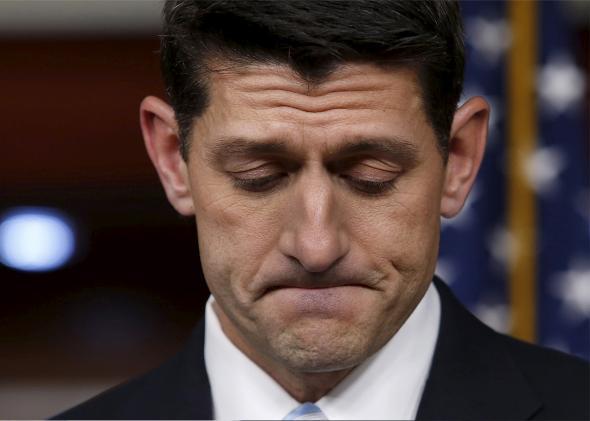Rep. Paul Ryan’s conditions for becoming speaker now seem more like, well, guidelines.
The great savior of the House of Representatives made explicit in the past couple of weeks that he had no interest in serving as the third-highest-ranking official in American government. He enjoys fiddling around with the tax code as chairman of the Ways and Means Committee almost as much as he enjoys shooting deer with his children. And he enjoys both things much more than he enjoys the prospect of trying in vain to persuade some 40-odd nihilists to fund the federal government every few months.
Ryan took the leverage that the Draft Ryan campaign offered him to set out some terms for accepting the gig. Though pitched as conditions that all factions would have to sign off on, they were obviously targeted to the House Freedom Caucus conservatives who took out Speaker John Boehner and pre-emptively nixed Majority Leader Kevin McCarthy’s bid. Ryan, arguing that he didn’t want to be the “third log in the fire,” requested a change in the rules that would make it much more difficult to evict a sitting speaker. He also requested the endorsement of each of the House Republican Conference’s major factions.
The Freedom Caucus acceded to neither.
The group, which has been around for less than a year but is just old enough to have a hilarious set of bylaws, only “endorses”—agrees to vote as a bloc—when 80 percent of its members sign off. Following a meeting in the Capitol on Wednesday night, the Freedom Caucus announced that it did not have enough internal agreement to “endorse” Ryan, but a “supermajority” did vote “to support Paul Ryan’s bid to become the next Speaker of the House.” Further, the group stated that while “no consensus exists among members of the House Freedom Caucus regarding Chairman Ryan’s preconditions for serving, we believe that these issues can be resolved within our Conference in due time.”
The Freedom Caucus’ shrewd counteroffer—no endorsement but a “supermajority” of support, and no rule changes but a promise to consider them later—was suitable to Ryan. “I’m grateful for the support of a supermajority of the House Freedom Caucus,” Ryan said in a statement. “I look forward to hearing from the other two caucuses by the end of the week, but I believe this is a positive step towards a unified Republican team.”
It sounds like Speaker Ryan is a go, and if so, this is an inauspicious start to his tenure. (Update, Oct. 22, 7:30 p.m.: Ryan made his speakership bid official on Thursday night.) He set terms intended to bring the Freedom Caucus to heel, and the Freedom Caucus didn’t agree to them but came just close enough to agreeing that it believed it’d avoid blame if Ryan bowed out. In other words, they seem to have successfully called Ryan’s bluff. (We’ve requested comment from Ryan’s communications director at the Ways and Means Committee, Brendan Buck, but in the meantime we’ll have to wait to see what resolving issues “within our Conference in due time” means.)
It’s also seriously troubling that Ryan reportedly agreed to abide by the so-called Hastert rule, which states that a speaker will only call up legislation that has the support of a majority of the majority conference. Boehner, too, tried to follow this rule, only to realize that adhering to it would mean the government would never be funded and the debt ceiling would never be raised. In the current configuration of the House, obeying the Hastert rule means abandoning the natural, ad-hoc governing coalition of Democrats and procedurally moderate Republicans that exists. It means obliging conservatives and calling up only their hardline legislation that goes nowhere in the Senate and faces a veto from President Obama. It means agreeing to a rule that needs to be broken in order to ensure global economic stability.
Assuming Ryan doesn’t abruptly drop his bid in the next couple of days, let’s hope that he and the Freedom Caucus have a gentlemen’s understanding to which we’re not privy, or the Freedom Caucus has offered him a grace period before running him out of town. If not, Ryan’s early concessions position him to be Boehner II, strung around on a leash by the radicals.
